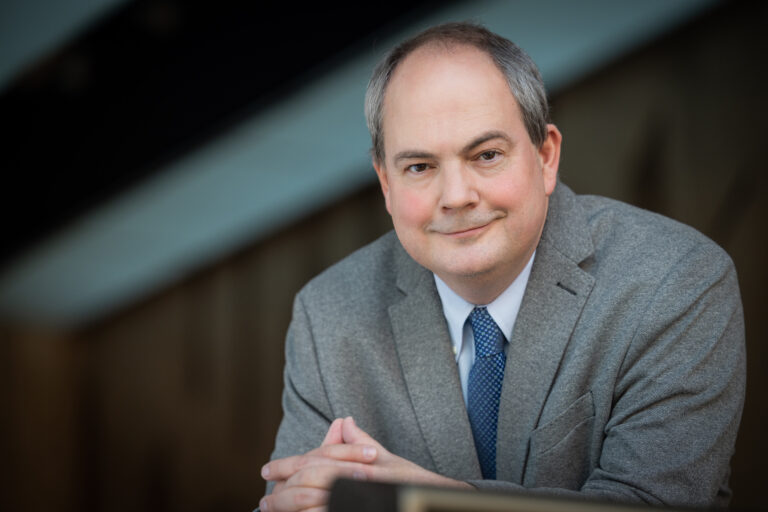Conductor György Vashegyi founded his Purcell Choir, specialising in early music performances, in 1990. The following year, he established his Orfeo Orchestra with its focus on the use of period instruments. Both remain key players in the Hungarian and international early music scenes. Over the course of more than three decades of effort, he has taken his place as Hungary’s leading representative of the historically informed performance style, as an internationally recognised conductor and as an outstanding artistic director within the Hungarian classical music world.
Since the start of his career, he has conducted thousands of performances at the most important concert venues in Hungary – such as the Liszt Academy, the Hungarian State Opera House, Esterházy Castle in Fertőd, and Müpa Budapest (including as part of the institution’s Early Music Festival) – and also regularly contributes to the programmes of the country’s other music ensembles and festivals. Researching obscure works from the musical literature of past centuries, primarily from the Baroque, Viennese Classical and Romantic periods, he reconstructs the sheet music and engages with the academic source criticism of background information required to forge it into concert-worthy material. He is also responsible for the establishment of the Haydneum – Hungarian Centre for Early Music in July 2021, serving as its artistic director since 2023. The Haydneum is an institution that fills a gap in Hungarian cultural life by not only presenting curiosities of early music, but also generating considerable value from an academic and international standpoint.
In addition to researching and performing the works of Haydn and other compositions from the musical repertoire of the 17th-19th centuries, another focus of his career is the rediscovery of French – Baroque and Romantic – opera. To this end, he has since 2012 developed close working relationships with the Centre de musique baroque de Versailles and the Venice-based Palazzetto Bru Zane, a research institute dedicated to French Romanticism, through which he has been methodically incorporating little-known gems from the French Baroque and Romantic opera repertoires into the Hungarian concert scene. In the past decade and a half, he has conducted the Purcell Choir, the Orfeo Orchestra, the Hungarian National Philharmonic Orchestra and the Hungarian National Choir in concert performances and CD recordings of more than 20 French operas (by Boismortier, Cardonne, Cherubini, David, Gervais, Leclair, Lemoyne, Méhul, Mondonville, Montéclair, Rameau and Stuck) that have been heard only rarely – or not at all – for centuries. Together with the HNP, he has now recorded four complete French Romantic operas (Massenet’s Werther, Thomas’s Psyché, Silver’s La Belle au bois dormant and Lalo’s Le Roi d’Ys). The latter, the most recent of the series, has received praise from leading international critics along with France’s most important recording awards (the Diapason d’Or and Diamant de l’Opéra), and is today considered the finest rendering of the masterpiece produced to date. With his own ensembles, he has made more than 70 CD recordings, with the latest two earning numerous prestigious awards: the one of Rameau’s opera Les Boréades, released by Warner Classics in 2024, won the Diapason d’Or, among other accolades, while the other album, titled Jouissons de Nos Beaux Ans! and featuring Cyrille Dubois, landed an International Classical Music Award in the Best Baroque Vocal Recording category.
In 2022, the Hungarian National Philharmonic appointed him chief music director of the Hungarian National Philharmonic Orchestra, with the shared objective of having him develop concert programmes based on the country’s own traditions while also remaining relevant at the international level. Under his leadership, the orchestra’s concert schedule has grown especially rich in the Viennese Classical repertoire, with important but rarely heard works receiving significant attention. Other areas of specialisation include classic Hungarian works, festive and season-opening concerts, and a deliberate affinity for French Romantic opera. The concert versions of – primarily French and Italian – operas they present as part of the HNP’s opera season ticket series also fulfil a cultural mission, bringing a neglected musical legacy back to the audience and earning international recognition for both the National Philharmonic and the National Choir. A special aim of Vashegyi’s is preserving the spirit of historically informed performance within the context of modern instrumental orchestras, and his programmes both honour Hungary’s musical heritage and broaden listeners’ musical horizons.
Over the decades, Vashegyi has received numerous awards and distinctions reflecting both the diversity of his achievements and their international appeal. These include the Liszt Award (2008), the Hungarian Classical Music Award (2009) and the Knight’s Cross of the Hungarian Order of Merit, Civil Division (2015). In 2021, France bestowed on him its highest state award, naming him a Chevalier de l’Ordre des Arts et des Lettres for his work in revitalising the French Baroque and Romantic repertoires. In 2024, he received the Kossuth Prize, one of Hungary’s loftiest state awards.
Having served as the president of both the Hungarian Academy of Arts for six years (from 2017 to 2023) and of the National Council of Culture (from 2020 to 2023), Vashegyi has proved himself to be more than simply a conductor: he also helps shape his country’s culture by interpreting the past through his sharp gaze into the future.


